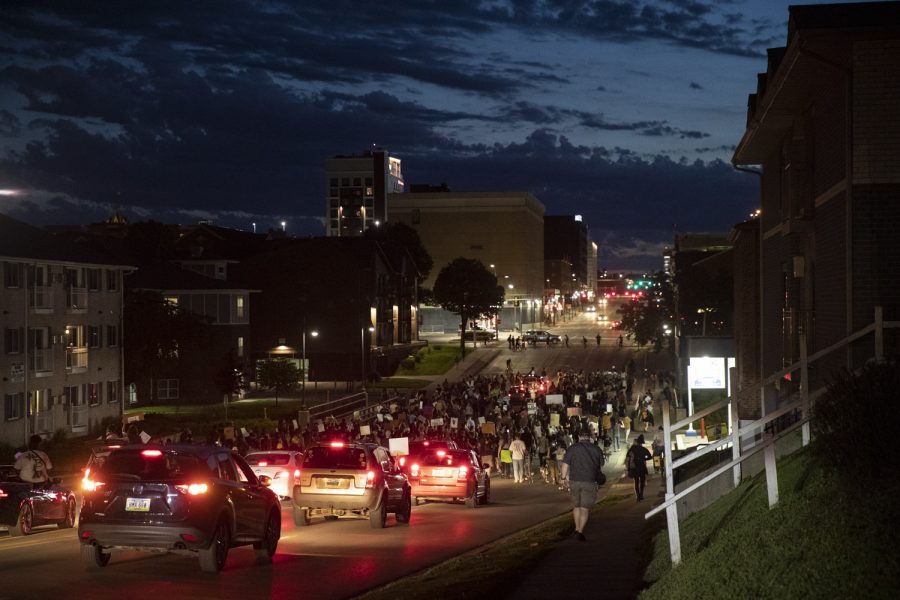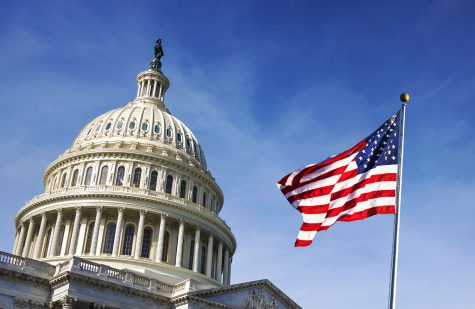Bill increasing penalties for protesters passes Iowa Senate on party lines
The bill outlines penalties for protesters engaging in assault, criminal mischief, rioting, unlawful assembly, disorderly conduct, and interference with public disorder control.
A crowd of protesters followed by a group of supporting vehicles travels west on Burlington Street towards downtown Iowa City during a march to support the Black Lives Matter movement and protest police brutality on Saturday, June 13.
March 10, 2021
On Wednesday the Iowa Senate passed a bill that creates harsher penalties for protesters in the wake of Black Lives Matter protests that happened this summer.
SF 534, which was passed 31-17 by a majority Republican vote, outlines penalties for protesters engaging in assault, criminal mischief, rioting, unlawful assembly, and disorderly conduct.
Sen. Julian Garrett, R-Warren, who introduced the bill, said the purpose of the bill’s provisions was to make people think twice about destroying property and assaulting officers.
This bill states that someone who commits an assault against certain employees or volunteers including peace officers, jailers, correctional staff, healthcare providers, and firefighters, and commits the assault with the intent to inflict injury, is committing a class D felony with minimum imprisonment of two years.
If that person has a weapon, the charge is increased to a class C felony.
Any other assault against certain employees or volunteers by an individual who is aware the person they are assaulting is one of the employees or volunteers listed in the bill would be charged with an aggravated misdemeanor.
The bill states that assault includes intentionally pointing a laser to cause pain or injury — something that happened in Iowa City at a Black Lives Matter protest in September 2020.
“If we’re going to have a civil society, and I think that’s what we all want, we have to have law enforcement,” Garrett said. “And the least we can do is get out and support them and do what we can to make their lives as safe as we possibly can.”
If any publicly owned property, including monuments, are damaged, an individual would be charged with criminal mischief in the second degree. At many Black Lives Matter protests that happened this summer and at the start of the school year, protesters sprayed graffiti on the Old Capitol building on the Pentacrest and around Kinnick Stadium.
The bill defines a “riot” as three or more people assembled in a violent manner and disturbing others, and those knowingly joining or remaining in a riot could be charged with a class D felony.
The bill says anyone arrested for criminal mischief, rioting, unlawful assembly or disorderly conduct will be held for 24 hours after the time of the arrest, unless the court releases them early.
The bill also states that drivers who unintentionally hit protesters unlawfully blocking the road will be immune from civil liability for injuring protesters. This does not apply to drivers acting recklessly or willfully.
RELATED: Bill increasing penalties for unlawful protests passes Senate committee
“No one in this chamber here in the Legislature wants to prevent a peaceful assembly,” said Sen. Dan Dawson, R-Council Bluffs. “But what we saw this last summer is that there are clearly nefarious actors out there who do not care about having a peaceful assembly and go there to cause havoc.”
Dawson described protesters who arrived with countermeasures to tear gas or gloves to throw tear gas canisters back at officers.
An amendment introduced by Sen. Liz Mathis, D-Hiawatha, required state and local law enforcement to collect data on every stop and that the Division of Criminal and Juvenile Justice Planning compile and make it available to the public, however it was determined not germane.
It prohibited disparate treatment, stated law enforcement agencies investigate those allegations of disparate treatment, and stated the right for individuals to pursue civil remedies if disparate treatment occurred.
“This amendment uplifts and extends what Governor Reynolds wants to see happen, what we all stood on the Capitol steps in June and cheered for when she signed justice reform legislation,” Mathis said. “But that was only the start, and we all agreed that was only the start.”
Mathis told the Senate collecting and analyzing data to confront racial profiling would help the Legislature understand what was happening in different communties.
Sen. Kevin Kinney, D-Oxford, introduced an amendment that would have changed the punishment for engaging in an unlawful assembly from aggravated misdemeanor to a serious misdemeanor and cut the section on criminal mischief. The amendment was not adopted.
Kinney said one example of a protesters’ behavior that motivated him to propose the amendment was kids going through bushes and trampling flowers on public property.
“Do we really want that to be a Class D felony that affects the kid the rest of their life? I was no perfect angel growing up … If they go through and these kids kick the flowers, that’s a class D felony. I just think that that’s too excessive in this bill,” he said.
The bill will head to the Iowa House next.



















